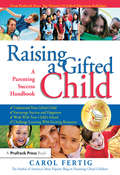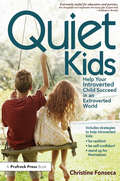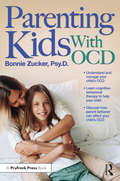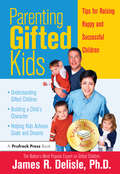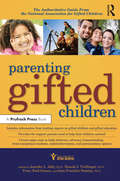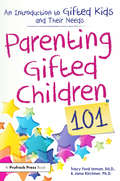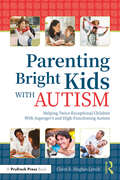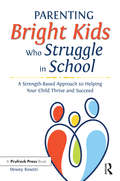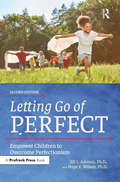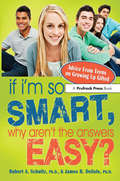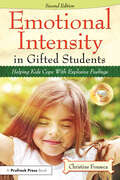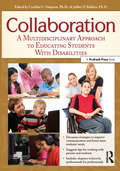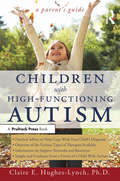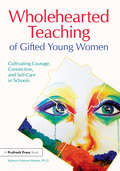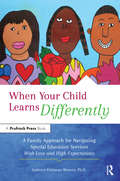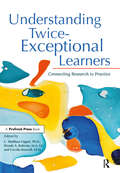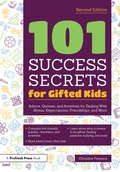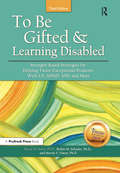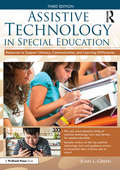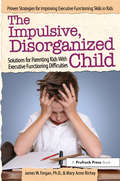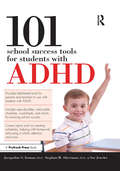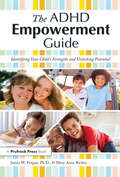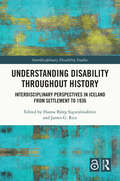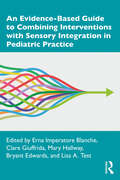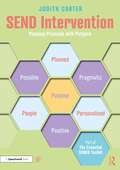- Table View
- List View
Raising a Gifted Child: A Parenting Success Handbook
by Carol FertigFrom the author of the nation's most popular blog on parenting gifted children comes the definitive how-to manual for parents, Raising a Gifted Child: A Parenting Success Handbook, a gifted education Legacy Award winner. Raising gifted children isn't easy, but when armed with the practical knowledge and tools in this exciting book, parents can navigate the maze of raising bright kids, leading to success in school and beyond. This book offers a large menu of strategies, resources, organizations, tips, and suggestions for parents to find optimal learning opportunities for their kids, covering the gamut of talent areas, including academics, the arts, technology, creativity, music, and thinking skills. The focus of this definitive resource is on empowering parents by giving them the tools needed to ensure that their gifted kids are happy and successful both in and out of school.Additional topics covered include volunteering at their child's school; different school options and specialty programs; tips for handling special circumstances; specific suggestions for each core content area; and strategies for finding the best resources for parents on the Web. This easy-to-read book is sure to be a favorite of parents of smart kids for years to come!Educational Resource
Quiet Kids: Help Your Introverted Child Succeed in an Extroverted World
by Christine FonsecaBeing an introverted child is difficult, especially in an ever-increasingly noisy world. Often viewed as aloof, unmotivated, or conceited, introverted children are deeply misunderstood by parents, educators, and even their peers. That's where Quiet Kids: Help Your Introverted Child Succeed in an Extroverted World comes in. Designed to provide parents with a blueprint for understanding the nature of introversion, Quiet Kids provides specific strategies to teach children how to thrive in a world that may not understand them. Presented in an easy-to-read, conversational style, the book uses real-world examples and stories from introverts and parents to show parents and educators how to help children develop resiliency and enhance the positive qualities of being an introvert. With specific strategies to address academic performance, bullying, and resiliency, Quiet Kids is a must-read for anyone wishing to enhance the lives of introverted children.
Parenting Kids With OCD: A Guide to Understanding and Supporting Your Child With OCD
by Bonnie ZuckerParenting Kids With OCD provides parents with a comprehensive understanding of obsessive-compulsive disorder, its symptoms, types, and presentation in children and teens. The treatment of OCD is explained, and guidelines on how to both find appropriate help and best support one's child are provided. Family accommodation is the rule, not the exception, when it comes to childhood OCD; yet, higher accommodating is associated with a worsening of the child's symptoms and greater levels of familial stress. Parents who have awareness of how they can positively or negatively impact their child's OCD can benefit their child's outcome. Case examples are included to illustrate the child's experience with OCD and what effective treatment looks like. OCD worsens when there is increased stress for the child; therefore, stress management is an essential component for improvement. Parents will learn how to manage stress in themselves and encourage effective stress management for their children.
Parenting Gifted Kids: Tips for Raising Happy and Successful Children
by James DelisleA gifted education Legacy Award winner, Parenting Gifted Kids: Tips for Raising Happy and Successful Children provides a humorous, engaging, and encouraging look at raising gifted children today. James R. Delisle, Ph.D., offers practical, down-to-earth advice that will cause parents to reexamine the ways they perceive and relate to their children.Dr. Delisle puts forward 10 tips to parents of gifted children—ideas that reflect attitude and approach and allow for introspection and change, rather than quick, do-it-tonight solutions. Some topics of interest include understanding a child's giftedness, working with the school system, dealing with perfectionism in gifted kids, and being adult role models for children. Along the way, stories from gifted children and their parents provide insight into the lives of these individuals.What sets this book apart from other books for parents of gifted kids is its expansion beyond mere platitudes. Dr. Delisle's tips go beyond the basics, focusing on attitude, reflection, and subtle changes, rather than specific, cookie-cutter recipes for action. The 10 tips suggested and expanded upon in this book include: understanding what giftedness is . . . and what it is not; understanding the differences between gifted kids and their agemates; understanding the personality traits of gifted kids, including overexcitabilities; taking charge of your child's education; understanding the issue of perfectionism in gifted kids; examining social nuances and myths related to giftedness; examining the similarities parents share with their gifted children; setting reasonable goals; helping gifted children make a difference in the lives of others; and remembering that gifted children are kids first and gifted second.Educational Resource
Parenting Gifted Children: The Authoritative Guide From the National Association for Gifted Children
by Jennifer L. Jolly Donald J. Treffinger Tracy Ford InmanWhen parents need the most authoritative information on raising gifted kids, they can turn to Parenting Gifted Children: The Authoritative Guide From the National Association for Gifted Children, a gifted education Legacy Award winner. This comprehensive guide covers topics such as working with high achievers and young gifted children, acceleration, advocating for talented students, serving as role models and mentors for gifted kids, homeschooling, underachievement, twice-exceptional students, and postsecondary opportunities.The only book of its kind, this guidebook will allow parents to find the support and resources they need to help their children find success in school and beyond. Written by experts in the field of gifted education and sponsored by the leading organization supporting the education of gifted and advanced learners, this book is sure to provide guidance, advice, and support for any parent of gifted children.Texas Association for the Gifted and Talented 2011 Legacy Book Award Winner - Parenting
Parenting Gifted Children 101: An Introduction to Gifted Kids and Their Needs
by Tracy Ford Inman Jana KirchnerThis practical, easy-to-read book explores the basics of parenting gifted children, truly giving parents the "introductory course" they need to better understand and help their gifted child. Topics include myths about gifted children, characteristics of the gifted, the hows and whys of advocacy, social and emotional issues and needs, strategies for partnering with your child's school, and more. Parenting Gifted Children 101 explores ways for you to help your child at home and maximize your child's educational experience with strategies that are based on research, but easy to implement. Each chapter—from parenting twice-exceptional students to navigating the possible challenges that school may hold for your child—contains resources for further reading and insights from more than 50 parents and educators of gifted children.Texas Association for the Gifted and Talented 2017 Legacy Book Award Winner - Parenting
Parenting Bright Kids With Autism: Helping Twice-Exceptional Children With Asperger's and High-Functioning Autism
by Claire E. Hughes-LynchParenting Bright Kids With Autism discusses the frustrations, the diagnoses, the challenges, and the joys as parents help their gifted children with autism spectrum disorders (ASD) thrive in school and at home. This book: Helps families navigate twice-exceptional life by translating best practice into helpful advice. Guides parents who are trying to reach out, find information, and develop their child's talents. Helps parents acknowledge and get help for, but not focus on, areas of challenge. Is written by a professor of special education who is also a mother of a gifted child with high-functioning autism. Is a revision of the popular Children With High-Functioning Autism. Topics range from understanding the first signs of autism and the diagnosis, finding a support network, and filling out necessary paperwork, to determining the various types of therapies available and planning for adulthood. The book also discusses issues that these kids may face as they become teenagers and enter college. With the advice and encouragement provided in this book, parents will receive valuable insight into this new world of caring for a gifted child with autism.
Parenting Bright Kids Who Struggle in School: A Strength-Based Approach to Helping Your Child Thrive and Succeed
by Dewey RosettiParenting Bright Kids Who Struggle in School guides parents through the challenging and often unfamiliar landscape of raising kids who have been labeled with learning differences, including dyslexia, ADHD, autism, sensory processing disorder, and more. This book:Builds upon Harvard professor Todd Rose's groundbreaking research in the "Science of Individuality."Helps parents target their child's jagged profile of strengths and weaknesses.Explains a child's context of learning and multiple pathways.Teaches revolutionary techniques to encourage strengths and mitigate weaknesses.Helps parents manage the emotional fallout of raising a child who does not conform to the "average" model of learning. Drawing from her own experience as a parent of a child with learning differences—who is now a highly successful adult—the author outlines clear lessons from a quarter century of advocating for kids who learn differently.
Letting Go of Perfect: Empower Children to Overcome Perfectionism
by Jill L. Adelson Hope E. WilsonLetting Go of Perfect gives parents and teachers the guidance and support they need to help children break free of the anxieties and behaviors related to perfectionism. This second edition:Explores a state of mind that manifests in unhealthy ways among kids and teens today—the need to be perfect.Features updated research on perfectionism, new strategies, and resources.Delineates the major types of perfectionism and provides practical tips.Explains how students can use their perfectionistic behaviors in a healthy way.Shares advice and stories from real parents, educators, and students.For children who believe their best is never good enough, perfectionism can lead to excessive guilt, lack of motivation, low self-esteem, depression, pessimism, obsessive or compulsive behavior, and a sense of rigidity. This engaging, practical book is a must-have for parents and teachers wanting to help children overcome perfectionism, raise self-confidence, lessen guilt, increase motivation, and offer a future free of rigidity.
If I'm So Smart, Why Aren't the Answers Easy?: Advice From Teens On Growing Up Gifted
by Robert A. Schultz James DelisleBased on surveys with more than 5,000 gifted young adults, If I'm So Smart, Why Aren't the Answers Easy? sheds light on the day-to-day experiences of those growing up gifted. In their own enlightening words, teens share their experiences with giftedness, including friendships and fitting in with peers, school struggles and successes, and worries about the future. By allowing teens to share their real-life stories, the book gives readers a self-study guide to the successes and pitfalls of being gifted in a world not always open to their unique and diverse needs. Teens will be able to reflect on their own experiences through the engaging journal prompts included in the book, and their parents and teachers will enjoy hearing directly from other students about the topics gifted teens face daily. Grades 6-10
Emotional Intensity in Gifted Students: Helping Kids Cope With Explosive Feelings
by Christine FonsecaTeaching children how to manage their intense emotions is one of the most difficult aspects of parenting or educating gifted children. Emotional Intensity in Gifted Students: Helping Kids Cope With Explosive Feelings provides a much-needed resource for parents and educators for understanding of why gifted children are so extreme in their behavior and how to manage the highs and lows that accompany emotional intensity. Presented in an easy-to-read, conversational style, this revised and updated second edition contains additional chapters addressing temperament and personality development, as well as expanded role-plays and strategies designed to show parents and teachers how to interact and guide gifted children in a way that teaches them how to recognize, monitor, and adjust their behavior. Updated resources and worksheets make this practical resource a must-read for anyone wishing to make a positive and lasting impact on the lives of gifted children.
Collaboration: A Multidisciplinary Approach to Educating Students With Disabilities
by Cynthia G. Simpson Jeffrey BakkenThis practical resource for teachers, professionals, and parents addresses collaboration, effective communication, and how to work with families. Information also is included on the many different professionals involved in the education of students with disabilities, such as occupational therapists, speech-language pathologists, school psychologists, intervention specialists, and more. Each chapter is written by actual professionals in that area and addresses roles and responsibilities of the authors' job, how they communicate with teachers and parents, and the direct services they provide to students and teachers. With a focus on how everyone must work together to meet student needs, this is an essential text for special education professionals.
Children With High-Functioning Autism: A Parent's Guide
by Claire E. Hughes-LynchChildren With High-Functioning Autism: A Parent's Guide offers parents the information needed to help them cope with their child's autism and to navigate the path as they first perceive differences, seek assistance and treatment, and help their child develop into his or her full potential.Including examples of the author's own experiences with her child with autism, this book helps families realize that there are others on similar paths—and that help is available. With topics ranging from understanding the first signs of autism and the diagnosis, finding a support network, and filling out necessary paperwork, to determining the various types of therapies available and planning for adulthood, this book provides parents with valuable insight into this new world.With an emphasis on high-functioning autism, Pervasive Developmental Disorder-Not Otherwise Specified, and Asperger's syndrome, Children With High-Functioning Autism: A Parent's Guide helps parents learn to celebrate small areas of growth and keep the focus on the child.
Wholehearted Teaching of Gifted Young Women: Cultivating Courage, Connection, and Self-Care in Schools
by Kathryn Fishman-WeaverWholehearted Teaching of Gifted Young Women explores the important role school communities play in supporting the social and emotional needs of high-achieving young women. Using a youth participatory action research model, this project follows 20 student researchers from high school through college. This longitudinal study leads to “Wholehearted Teaching,” a new framework for cultivating courage, connection, and self-care in schools. Framed with personal stories and filled with practical suggestions, this book offers strategies for teachers, counselors, parents, and high-achieving young women as they navigate the precipice of youth and everything after.
When Your Child Learns Differently: A Family Approach for Navigating Special Education Services With Love and High Expectations
by Kathryn Fishman-WeaverAdvocating for a child who learns differently can sometimes feel like an isolating and daunting task. This book reminds families that they are not alone. When Your Child Learns Differently is a compassionate guide that:
Understanding Twice-Exceptional Learners: Connecting Research to Practice
by Wendy Behrens Cecelia Boswell C. Matthew FugateUnderstanding Twice-Exceptional Learners offers an in-depth look at the needs and lived experiences of students who are twice-exceptional. This book:Includes detailed examinations of co-occurring disabilities commonly found in twice-exceptional populations.Features studies of ADHD, dyslexia, dyscalculia, autism spectrum disorders (ASD), anxiety, OCD, and more.Bridges the divide between research about and practical strategies for teaching gifted students with learning challenges.Is Ideal for university teacher preparation courses and graduate programs.Provides strength-based strategies that focus on students' unique gifts and talents.Each chapter includes a comprehensive literature review, suggested interventions, resources for further exploration, and vignettes that highlight experiences of twice-exceptional students and the behaviors and needs that practitioners might commonly see in the classroom.
101 Success Secrets for Gifted Kids: Advice, Quizzes, and Activities for Dealing With Stress, Expectations, Friendships, and More
by Christine FonsecaPssst! Want to know a secret? Want to help gifted kids harness the power of their giftedness? The second edition of 101 Success Secrets for Gifted Kids is a must-read for gifted kids ages 8 to 12 who want to find success in school, relationships, and life. This book:Includes 101 awesome secrets, tips, and tricks for gifted kids.Is chock-full of fun quizzes, activities, and practical strategies.Covers bullying, school performance, perfectionism, friendships, sibling rivalries, and managing intensities.Features Q & A sections from other gifted kids and preteens.Gives gifted kids insight into everything they've ever wanted to know about being gifted.Proven strategies for dealing with stress management, parents' and teachers' expectations, anxiety, cyberbullying, friendship troubles, and more make this the must-have guide for every gifted kid.Ages 8-12
To Be Gifted and Learning Disabled: Strength-Based Strategies for Helping Twice-Exceptional Students With LD, ADHD, ASD, and More
by Susan M. Baum Robin M. Schader Steven V. OwenTo Be Gifted and Learning Disabled is one of the most popular resources available on identifying and meeting the needs of twice-exceptional students. This updated third edition provides a comprehensive look at the complex world of students with remarkable gifts, talents, and interests, who simultaneously face learning, attention, or social challenges from LD, ADHD, ASD, and other disorders. Through case studies and years of research, the authors present a rationale for using a strength-based, talent-focused approach to meeting the needs of this special population. From a thorough description of twice-exceptionality and the unique learning patterns of these students, to strategies for identification, comprehensive programming, talent development, and instructional strategies, this book explores the distinguishing strengths (yellows) and complex challenges (blues) that these students face. In painting, green is a mix of yellows and blues. Because of their individual characteristics, twice-exceptional students come in a remarkable range of greens. 2018 NAGC Book of the Year Award Winner
Assistive Technology in Special Education: Resources to Support Literacy, Communication, and Learning Differences
by Joan L. GreenAssistive Technology in Special Education presents a wealth of practical, well-organized information to help families, teachers, and therapists find effective solutions for students with learning, literacy, and cognitive challenges. This third edition features new affordable tools to improve and compensate for challenges related to speaking, understanding, reading, writing, and thinking and remembering, as well as strategies to help students become more organized and efficient. Also highlighted are iOS devices, G Suite (Google Apps and Extensions), online collaborative sites, and features built into the computers and mobile devices readers already use. As technology changes and new operating systems make older programs obsolete, this book will empower readers to explore the most current resources as they become available.
The Impulsive, Disorganized Child: Solutions for Parenting Kids With Executive Functioning Difficulties
by Mary Anne Richey James W. ForganImpulsive, scattered, lost, unfocused, unprepared, disorganized: These are just a few of the words used to describe kids with executive functioning deficits, which commonly affect many children already diagnosed with ADHD, learning disabilities, and autism. The Impulsive, Disorganized Child: Solutions for Parenting Kids with Executive Functioning Difficulties helps parents pinpoint weak executive functions in their children, then learn how to help their kids overcome these deficits with practical, easy solutions. Children who can't select, plan, initiate, or sustain action toward their goals are children who simply struggle to succeed in school and other aspects of life. Parents need the helpful, proven advice and interactive surveys and action plans in this book to empower them to take positive action to teach their disorganized, impulsive child to achieve independence, success, and a level of self-support.
101 School Success Tools for Students With ADHD
by Sue Jeweler Stephan M. Silverman Jacqueline S. Iseman101 School Success Tools for Students With ADHD provides the materials and guidance necessary to assist teachers and parents as they empower students with ADHD to become successful learners. Based on field-tested strategies for use with learners with ADHD, the book provides a brief overview of the specific learning needs of these students, as well as a wide variety of tools that teachers can immediately pull out and use in the classroom and parents can use in the home setting.Each tool is explained in a brief how-to section that includes specific information on adapting the tool based on the individual student's needs. The book covers topics that include observing and collecting data on students, creating schedules, assessing a child's strengths, refocusing a child's attention, managing difficult behaviors, implementing calming techniques, providing motivation, and improving study and homework skills. A collection of worksheets, forms, checklists, charts, website listings, and other tools are included as reproducible pages.
The ADHD Empowerment Guide: Identifying Your Child's Strengths and Unlocking Potential
by Mary Anne Richey James W. ForganRated one of the "Best ADHD Books of All Time" by Book Authority The ADHD Empowerment Guide is different from other parenting ADHD books because it helps parents identify and build upon their child's strengths and natural talents in order to develop a specific plan to unlock their child's potential. Parents are invited to complete two easy-to-follow questionnaires to identify their child's natural abilities, as well as determine key characteristics in their child that research has shown to help children with ADHD succeed in life. These characteristics include emotional control, integrity, grit, resiliency, resourcefulness, organization, motivation, school fit, support systems, and productive use of technology. Using the practical strategies presented, strength-building activities, and the information learned from the questionnaires, parents can develop a success plan that will unlock their child's potential and build a positive outlook on the journey of raising a child with ADHD. The authors, two professionals who have “been there and done that” with their own children with ADHD, illustrate their strategies and content by highlighting successful people with ADHD who excelled in various areas and share some of their success secrets to raising a successful child with ADHD.
Understanding Disability Throughout History: Interdisciplinary Perspectives in Iceland from Settlement to 1936 (Interdisciplinary Disability Studies)
by Hanna Björg Sigurjónsdóttir James G. RiceUnderstanding Disability Throughout History explores seldom-heard voices from the past by studying the hidden lives of disabled people before the concept of disability existed culturally, socially and administratively. The book focuses on Iceland from the Age of Settlement, traditionally considered to have taken place from 874 to 930, until the 1936 Law on Social Security (Lög um almannatryggingar), which is the first time that disabled people were referenced in Iceland as a legal or administrative category. Data sources analysed in the project represent a broad range of materials that are not often featured in the study of disability, such as bone collections, medieval literature and census data from the early modern era, archaeological remains, historical archives, folktales and legends, personal narratives and museum displays. The ten chapters include contributions from multidisciplinary team of experts working in the fields of Disability Studies, History, Archaeology, Medieval Icelandic Literature, Folklore and Ethnology, Anthropology, Museum Studies, and Archival Sciences, along with a collection of post-doctoral and graduate students. The volume will be of interest to all scholars and students of disability studies, history, medieval studies, ethnology, folklore, and archaeology.
An Evidence-Based Guide to Combining Interventions with Sensory Integration in Pediatric Practice
by Erna Imperatore Blanche Clare Giuffrida Mary Hallway Bryant Edwards Lisa A. TestThis book offers practical ideas on the combination of sensory integration theory principles with other evidence-based approaches in the evaluation and treatment of multifaceted issues in children with disabilities. Using the ICF Model, a Clinical Reasoning Model, and featuring numerous case studies, the opening chapters focus on the evidence for combining intervention approaches with diagnoses most often encountered in clinical practice. The latter half of the book covers the delivery of services using blended intervention approaches in different settings, such as the school, the hospital, and in nature. Featured are existing community programs illustrating the combination of approaches in practice. Appendices include reproducible resources, a guide to assessments, and approaches. The text will guide occupational therapists and other health professionals working with children and adolescents across a variety of settings in using clinical reasoning skills in a systematic manner that will lead to better interventions.
SEND Intervention: Planning Provision with Purpose (The Essential SENCO Toolkit)
by Judith CarterThe second in The Essential SENCO Toolkit series, this resource clarifies and explores the key distinctions between quality first teaching adjustments, resources/support and interventions. It allows practitioners to develop their practice effectively and strategically to capture the true impact of SEND provision, by shifting the focus from the ‘who and when’ to the ‘what and why’. Chapters also include original frameworks – the 4 Functions of Learning Support – to help with the deployment of teaching assistants and to provide a shared language of support, as well as resources that support the application of the 7 Cs Learning Portfolio (introduced in the first book in the series, SEND Assessment) and an intervention index to fully understand the purpose and effectiveness of interventions. Key features offered: An introduction to the 4 Functions of Learning Support, providing a measurable language of learning support to help practitioners to organise and deploy teaching assistants as part of their SEND provision An intervention index to enable individual or MAT-based SENCOs to capture their own evidence base regarding the purpose and impact of interventions Intervention action cards and targeted outcomes for all 49 themes within the 7 Cs Learning Portfolio A photocopiable and downloadable programme of materials that can be used by readers to gain a better understanding of interventions. SEND Intervention will promote confidence and clarity regarding the rationale for SEND provision. This essential resource provides a practical toolkit to support both new and experienced SENCOs and SEN practitioners.
